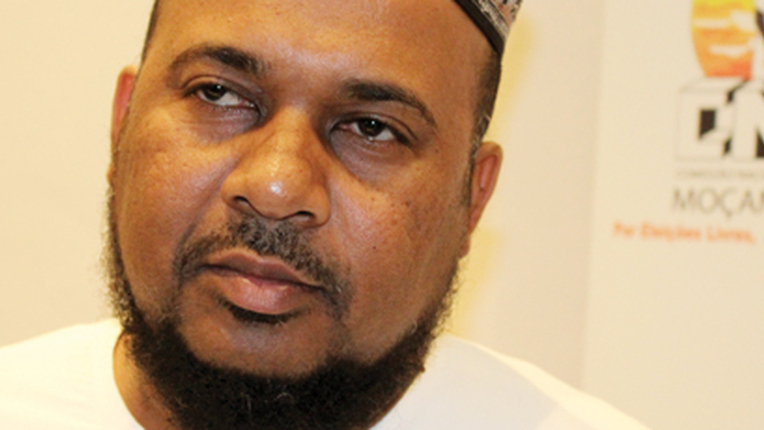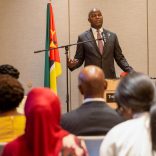EU supports two CSOs that assist technical committee in Mozambique's inclusive political dialogue
Polling Station Minutes Never Disappeared: Sheik Abdul Carimo Sau, Head of Mozambique National Elections Commission

In File Photo / Sheik Abdul Carimo Sau.
The chairperson of Mozambique’s National Elections Commission (CNE), Abdul Carimo, has categorically denied the claim that polling station minutes and results sheets (“editais”) went missing from the October 2014 general elections.
In a Tuesday interview with the Maputo daily “Noticias”, Carimo said this was a rumour deliberately spread by a newspaper. He did not mention the paper by name, but he was clearly referring to the anti-government weekly “Canal de Moçambique” and its sister website.
A journalist from this paper rang him up one evening to ask for access to the polling station minutes, said Carimo. But he received the call at about 21.30, when he was already at home. So Carimo asked the reporter to ring the head of his office the following morning, and the access he was requesting would be granted.
At 06.00 the following morning, Carimo was surprised to see his picture and that of Felisberto Naife, general director of the CNE’s executive body, the Electoral Administration Technical Secretariat (STAE), splashed across the front page of the paper with the headline “Where are the minutes?”
“The journalist who asked me – and I still have a message from him recorded on my phone – even today continues to claim that the minutes disappeared”, said Carimo. “But from the day that we talked up until now, they have never come to look at the minutes”.
And one political party “continues to talk about the disappearance of the minutes”. Carimo did not mention which party, but he was talking about the former rebel movement Renamo. The head of the Renamo parliamentary group, Ivone Soares, even repeated the “Canal de Mocambique” claim as late as 17 December, at the closing session of a sitting of the country’s parliament, the Assembly of the Republic.
She claimed that the elections results were proclaimed “without results sheets”, and that Renamo leader Afonso Dhlakama was “the true winner of the presidential elections”.
Carimo pointed out that Renamo is represented on the CNE, and that the CNE had ordered the electoral material in the districts to be kept under lock and key, in places where representatives of the political parties had keys. The same was true in the provinces and nationally.
“We have a strong box in STAE, where each representative of the parties had a key and a padlock”, he said. “Right up until now, that strong box is closed, and the party representatives still have their keys. The law says that the election material is protected by the CNE chairperson, but I can’t go there and open it on my own without the presence of the others who have keys. All this was done to guarantee transparency”.
No polling station results sheets or minutes had disappeared, stressed Carimo. “I have all the results sheets and minutes signed by all those involved in the process”, he added. The continued claims that these documents had disappeared was just “an attitude of bad faith”, arising from a rumour spread by a newspaper.
Carimo had no doubt that the electoral legislation needs, once more, to be overhauled. One peculiarity with the Mozambican system is that every time general elections are held, the electoral laws are rewritten. At Renamo’s demand, the laws were thoroughly amended in February 2014, less than eight months before the election date.
“This meant that several activities envisaged in the electoral calendar overlapped”, said Carimo. The calendar ought to be drawn up ensuring that there is no such overlap. “Unfortunately, it happened once again”, he lamented.
Carimo urged parliamentarians to amend the legislation in good time, preferably by the end of this year “so as to allow the electoral calendar to be drawn up without this kind of problem”. Carimo wanted the electoral legislation in place before the population census of 2017, on which the voter registration will be based for the municipal elections of 2018 and the general elections of 2019.
Carimo thought it crucial to reduce the size of the electoral bodies. The CNE, the provincial, city and district elections commissions, and the central, provincial, district and city branches of STAE were all stuffed full of political appointees (from the ruling Frelimo Party, Renamo and the Mozambique Democratic Movement, MDM). This created an extremely top-heavy, unwieldy and expensive structure.
“We don’t have the premises to accommodate this number of people”, said Carimo, “and so, in the last elections, the members of the CNE’s support bodies worked under conditions that were not very dignified”.
Laws passed by parliament “should take the reality of the country into account”, he urged. “The country has no way of meeting the demands posed by electoral bodies with large numbers of members. We are talking about space, we are talking about vehicles, we are talking about training material for these people”.
To make matters worse, the political parties tended to appoint people who had no previous experience of elections, Carimo added, “and who have no information about the electoral laws, about the Constitution, or about the procedures necessary for the operations of electoral bodies”.
For the 2015 elections, the CNE and STAE had been completely politicized, thus reversing a previous trend to reduce gradually the weight of the political parties in the electoral administration. For Carimo, however, the key question was not whether political parties were inside the electoral bodies or not, but whether this helped ensure acceptance of the results.
The major purpose was that, at the end of the day, everyone should know who had won and who had lost. “If the politicization of the electoral bodies means that people accept election results, without disputing them, then I agree with politicization”, exclaimed Carimo.
“But if politicization comes to the same thing as de-politicisation, where those who lose the elections don’t accept the results, then where’s the benefit?”, he asked.













Leave a Reply
Be the First to Comment!
You must be logged in to post a comment.
You must be logged in to post a comment.